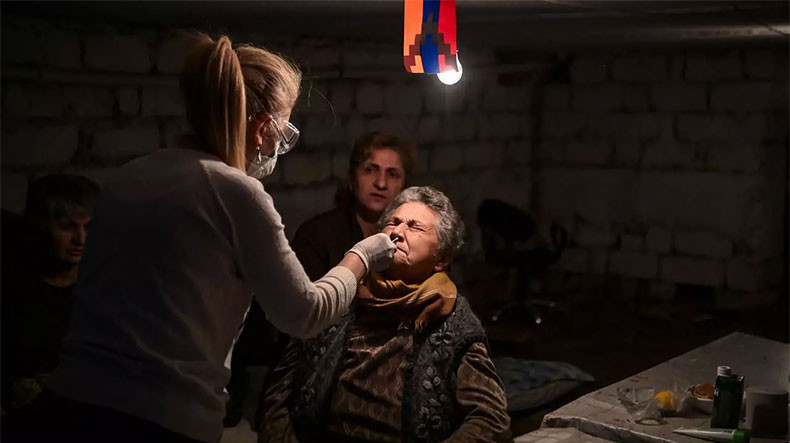
Coronavirus thrives in Karabakh's bomb shelters - AFP
Close quarters, poor ventilation and no masks: in the cellars of Stepanakert, the capital of the disputed Nagorno-Karabakh province, residents who have not fled fierce fighting may be safe from shelling, but not coronavirus, AFP reports.
Adjoining basements beneath one unassuming three-storey building in the city have been repurposed as a bomb shelter, where residents are seeking refuge from frequent bouts of shelling by Azerbaijan's forces, including on Friday evening.
The largest room in the basement -- around 50 square metres with a ceiling lower than 2 metres (6.5 feet) -- serves as the sleeping quarters. Around ten mattresses and blankets are placed on stone benches built against the walls and the earthen floor is carpeted with cardboard boxes.
A few dim lamps hang from the ceiling over an ageing wood stove in the middle of the room, its chimney running to an outside wall.
Lusine Tovmasyan used to run a medical testing centre in Stepanakert.
But when fighting erupted four weeks ago, the 44-year-old began working for the health authorities, carrying out coronavirus tests at the city's main hospital or at the homes of residents unable to travel.
The sixty-year-old woman with a shawl over her shoulders is tested in the living room of her apartment on the ground floor and experiences similar discomfort, muttering a few words in a weak voice and grimacing.
"We do an average of 60 tests per day," says Tovmasyan, the only person among a half-dozen women in the cellar to be wearing a mask.
"The infection rate is quite high," she says because "people are living in groups in basements without masks".
"Between 40 and 60 percent of people test positive. It depends on the day".
After swabs are processed in the Armenian capital Yerevan -- around four hours away by road -- Tovmasyan says health workers compile lists of whose returned positive and the people they were in contact with.
There is no testing at an infectious diseases clinic near the central hospital in Stepanakert, but the facility does treat patients with coronavirus symptoms.
Nurses are busy in one of the wards administering intravenous drips for three seated and masked men.
Samvel Galstyan, 62, doesn't know whether or not he has coronavirus. He came to the facility because he had "a high temperature".
"It's cold in the basement. You go to bed and get up without changing your clothes. You can't stay there so you come in and out often. Hot, cold, hot, cold, and here I am," he said.
The chief doctor on the ward, 63-year-old Raya Simonyan, estimates that 90 percent of Stepanakert's remaining residents have coronavirus, but admits she has no official figures.
"The situation is very bad (...) A majority of residents are sick," she says.
Back in the basement, a brown-haired 15-year-old teenage girl briefly emerges from under a large blanket before disappearing again.
Next to her on the edge of the bed, the girl's mother is staring vacantly.
Her husband and son are fighting at the front, she says, and she does not know where exactly they are although she speaks to them regularly.
"We want peace and for the war to end as soon as possible," she says tearfully.
Newsfeed
Videos






























